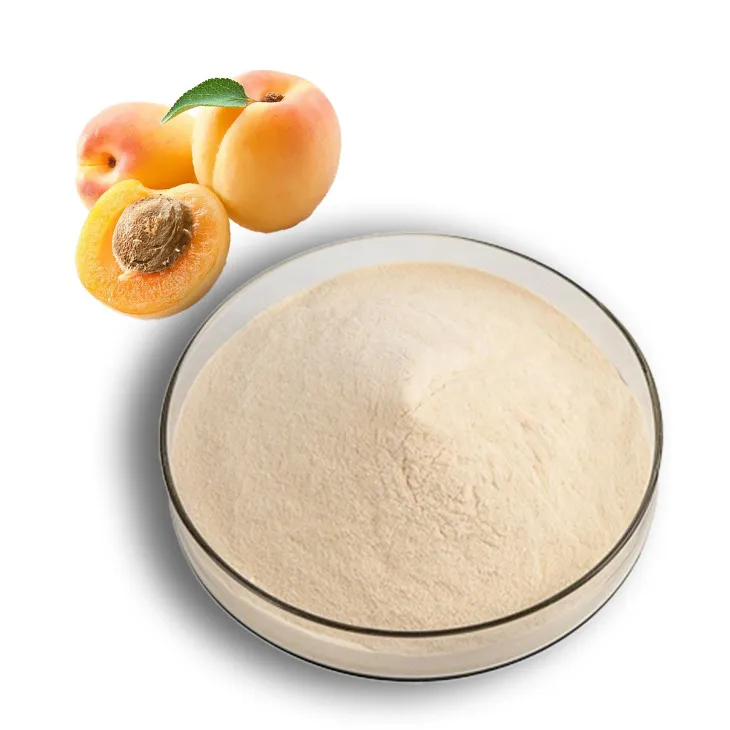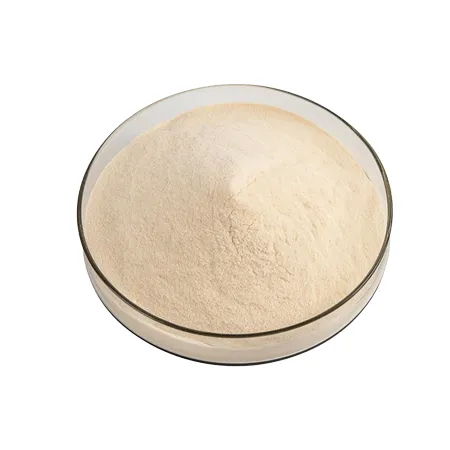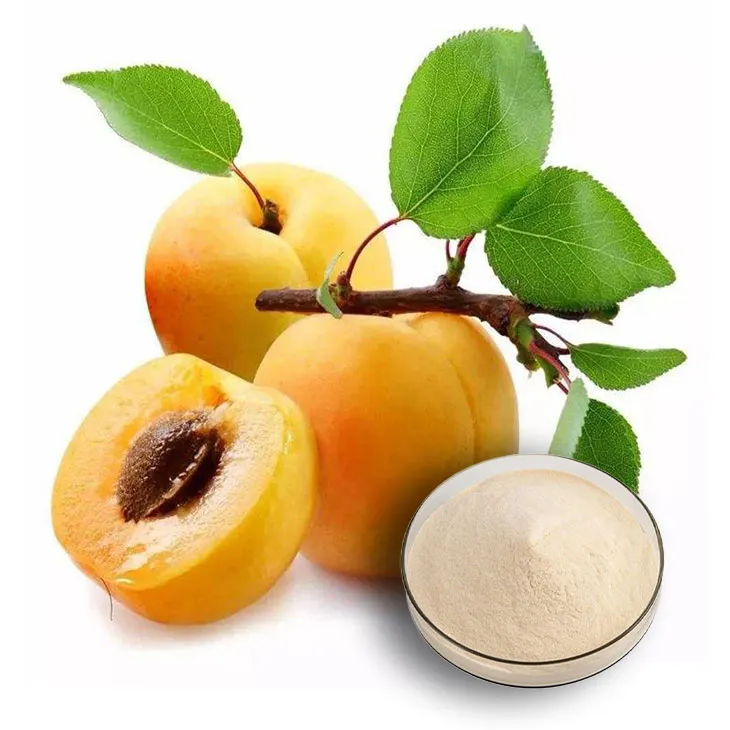- 0086-571-85302990
- sales@greenskybio.com
Organic Apricot Powder Factory
2024-11-28

Introduction
An organic Apricot Powder factory is an essential part of the modern food industry. It focuses on the conversion of fresh, high - quality organic apricots into a convenient and versatile powder form. This powder has found its way into numerous food products and health - related applications, making the factory a key player in the supply chain.

The Source of Apricots
The journey of the Apricot Powder begins with the selection of apricots. These apricots are sourced from organic orchards.
Organic Certification
The orchards must meet strict organic certification standards. This means that they are free from synthetic pesticides, fertilizers, and genetically modified organisms (GMOs). The soil in these orchards is managed in an environmentally friendly way, often using natural compost and crop rotation methods. The apricot trees are also grown without the use of artificial growth regulators.
Harvesting
When it comes to harvesting, the apricots are picked at the optimal time. This is crucial as it affects the taste, texture, and nutritional content of the final product. The farmers in the organic orchards use careful hand - picking methods in many cases to ensure that only the ripe apricots are selected. This helps in maintaining the high quality of the apricots that will be processed in the factory.

Processing Steps
Once the apricots reach the factory, they go through a series of processing steps.
1. Washing
The first step is washing. The apricots are thoroughly washed to remove any dirt, debris, or potential contaminants. This is done using clean water and sometimes mild, food - grade detergents. The washing process is carefully monitored to ensure that all impurities are removed without affecting the integrity of the apricots.
2. Drying
After washing, the apricots are dried. Drying is an important step as it helps in preserving the nutritional value of the apricots. There are different methods of drying that can be used in the factory.
Sun - Drying
One traditional method is sun - drying. In this method, the apricots are spread out in a clean, sunny area. However, this method is highly dependent on weather conditions and requires careful monitoring to prevent spoilage. It also takes a relatively long time compared to other drying methods.
Dehydrator Drying
Another option is using a dehydrator. Dehydrators provide a controlled environment for drying. They can adjust the temperature and air flow, which helps in drying the apricots more quickly and evenly. This method is more reliable in terms of quality control as it can be precisely regulated.
3. Grinding
Once the apricots are dried, they are ground into a fine powder. This is achieved using advanced milling equipment.
Grinding Technology
The milling equipment is designed to break down the dried apricots into a fine, consistent powder. It can adjust the fineness of the powder according to the requirements of different applications. For example, if the powder is to be used in smoothies, a finer texture may be preferred, while for bakery items, a slightly coarser texture might be more suitable.

Applications of Organic Apricot Powder
The organic apricot powder has a wide range of applications in the food industry and beyond.
1. Bakery Items
In the world of bakery, apricot powder can be used in various ways.
- It can be added to cake batters to enhance the flavor. The natural sweetness and fruity aroma of the apricot powder can give a unique taste to cakes, making them more appealing.
- For bread making, apricot powder can be incorporated into the dough. It not only adds flavor but also can contribute to the nutritional value of the bread. For example, it can be a source of vitamins and dietary fiber.
- In pastries such as tarts and pies, apricot powder can be used in the filling or as a topping. It can provide a burst of flavor and a beautiful color to these sweet treats.
2. Smoothies
When it comes to smoothies, apricot powder is a great addition.
- It can be easily blended with other fruits, vegetables, and liquids to create a delicious and nutritious smoothie. The apricot powder adds a natural sweetness, reducing the need for added sugars.
- It can also be combined with protein powders, nuts, and seeds to make a more filling and balanced smoothie. For those who are health - conscious, this is an ideal way to get the benefits of apricots in a convenient form.
3. Health Supplements
The organic apricot powder is also a valuable ingredient in health supplements.
- It is rich in vitamins such as vitamin A, which is important for eye health, and vitamin C, which is an antioxidant that helps boost the immune system.
- Apricot powder also contains dietary fiber, which can aid in digestion and help maintain a healthy digestive system.
- Some health supplements use apricot powder as a base or an additive to provide additional nutrients to consumers. It can be formulated into tablets, capsules, or powder - based supplements.
Quality Control in the Factory
The organic apricot powder factory places a great emphasis on quality control.
1. Raw Material Inspection
Before the apricots are processed, they are carefully inspected.
- The quality of the apricots from the organic orchards is checked for any signs of damage, disease, or non - compliance with organic standards.
- Only apricots that meet the strict quality requirements are allowed to enter the processing line.
2. Processing Monitoring
During the processing steps, continuous monitoring takes place.
- The washing process is monitored to ensure that all impurities are removed effectively.
- The drying process is checked for proper temperature and humidity levels to ensure that the apricots are dried correctly without losing too much of their nutritional value.
- The grinding process is supervised to make sure that the powder has the right texture and fineness.
3. Final Product Testing
Once the organic apricot powder is produced, it undergoes comprehensive testing.
- Chemical analysis is done to check for the presence of any contaminants, such as heavy metals or pesticides residue, even though the apricots are from organic sources.
- Nutritional analysis is carried out to verify the content of vitamins, minerals, and dietary fiber in the powder.
- Microbiological testing is also performed to ensure that the powder is free from harmful bacteria, yeasts, and molds.
Sustainable Production Methods
The organic apricot powder factory is committed to sustainable production.
1. Energy Conservation
The factory takes steps to conserve energy.
- It uses energy - efficient equipment for processing, such as dehydrators with low - energy consumption motors and milling equipment with optimized power usage.
- Lighting in the factory is often replaced with energy - saving bulbs or LED lights to reduce electricity consumption.
2. Waste Management
Proper waste management is also a priority.
- Any waste generated during the processing, such as apricot pits or peelings, is either recycled or used for other purposes. For example, apricot pits can be used to make bio - fuels or in the production of handicrafts.
- The factory also aims to reduce packaging waste by using recyclable and biodegradable packaging materials for the organic apricot powder.
3. Water Conservation
Water is conserved in the factory.
- The washing process is designed to use water efficiently, for example, by using water - recycling systems.
- Any leaks or unnecessary water usage in the factory is promptly detected and fixed.
Conclusion
The organic apricot powder factory is a complex and important part of the food industry. It starts with the careful selection of apricots from organic orchards, processes them through strict procedures, and produces a high - quality powder with a wide range of applications. Through strict quality control and sustainable production methods, it not only provides a valuable product but also contributes to the overall well - being of the environment and consumers.
FAQ:
Question 1: What are the main raw materials for an organic apricot powder factory?
The main raw material is high - quality organic apricots sourced from organic orchards.
Question 2: What are the processing steps in an organic apricot powder factory?
First, the apricots are thoroughly washed to remove impurities. Then they are dried to preserve their nutritional value. Finally, the dried apricots are ground into a fine powder using advanced milling equipment.
Question 3: What are the applications of organic apricot powder?
It can be used in the production of various food products such as bakery items, smoothies, and health supplements.
Question 4: How does the factory ensure the quality of organic apricot powder?
The factory adheres to strict quality control standards to ensure that the organic apricot powder is pure, safe, and of the highest quality.
Question 5: What does the factory do to protect the environment?
The factory focuses on sustainable production methods to minimize environmental impact.
Related literature
- Organic Food Processing: Principles and Practices"
- "Sustainable Production in the Food Industry"
- "Quality Control in Organic Food Manufacturing"
- ▶ Hesperidin
- ▶ citrus bioflavonoids
- ▶ plant extract
- ▶ lycopene
- ▶ Diosmin
- ▶ Grape seed extract
- ▶ Sea buckthorn Juice Powder
- ▶ Beetroot powder
- ▶ Hops Extract
- ▶ Artichoke Extract
- ▶ Reishi mushroom extract
- ▶ Astaxanthin
- ▶ Green Tea Extract
- ▶ Curcumin Extract
- ▶ Horse Chestnut Extract
- ▶ Other Problems
- ▶ Boswellia Serrata Extract
- ▶ Resveratrol Extract
- ▶ Marigold Extract
- ▶ Grape Leaf Extract
- ▶ blog3
- ▶ blog4
-
Standard - process propolis extract powder.
2024-11-28
-
How to make powder with peppermint oil?
2024-11-28
-
Organic konjac powder, Australia.
2024-11-28
-
Chinese Cassia Seed Extract Suppliers.
2024-11-28
-
Suppliers of Organic Diosmin Powder.
2024-11-28
-
Buckthorn bark extract
2024-11-28
-
Sophora Japonica Flower Extract
2024-11-28
-
Centella Asiatica Extract
2024-11-28
-
Grape Leaf Extract
2024-11-28
-
Sugarcane Extract
2024-11-28
-
Acai Berry Extract
2024-11-28
-
Phyllanthus Emblica Extract
2024-11-28
-
Troxerutin
2024-11-28
-
Ivy Extract
2024-11-28
-
Angelica sinensis extract
2024-11-28





















